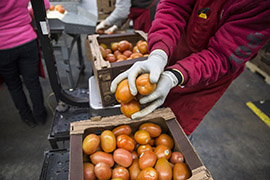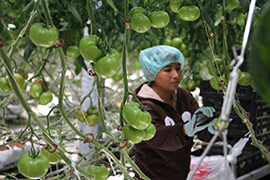- Slug: BC-CNS-Tomato Wars,740 words.
- 2 file photos available. (thumbnails, captions below)
By Lux Butler
Cronkite News
WASHINGTON – The U.S. is involved in a “critically important trade battle” that could cost the Arizona economy billions while raising the price of tomatoes to consumers by as much as 50%, according to one study.
That’s what Arizona businesses and lawmakers say will happen if the Commerce Department gives in to demands to raise tariffs and overhaul an agreement on tomatoes imported from Mexico, an agreement that growers in Florida and other states say is being abused.
The effort is the most recent in a decades-long conflict between tomato growers in the U.S. and Mexico – and the companies here that rely on Mexican imports for their livelihoods.
U.S growers, led by the Florida Tomato Exchange, accuse Mexico of dumping tomatoes in the U.S. market in violation of agreements dating back to 1996. Those abuses have continued under the latest deal, the 2019 Tomato Suspension Agreement, which led the exchange to petition the Commerce Department in June to end the agreement and begin imposing anti-dumping duties on Mexican tomatoes.
The exchange said that Mexico’s share of the U.S. tomato market has grown from 20% in 1994, when the North American Free Trade Agreement took effect, to 70% today. U.S. growers have suffered as a result, they say.
But a study by an Arizona State University professor said that imposing penalties on Mexican tomatoes will only drive up prices for consumers here, while hurting the nearly 23,000 Arizonans who work in the tomato industry.
Timothy Richards, who wrote the report, estimated that Arizona would be hit the hardest, losing more than $3 billion in business that would lead to the loss of $123.3 million in state taxes and $15.8 million in local taxes per year.
That was echoed by Javier Badillo, an Arizona-based salesman for Fresh International.
Imposing fees on Mexican tomatoes “would impact everyone, the truck drivers, the packers, basically anyone that works to get those tomatoes from the farms to the stores,” Badillo said.
Lance Jungmeyer, president of the Fresh Produce Association of the Americas, said U.S. growers are simply trying to protect a product that consumers don’t prefer.
He said Mexican tomatoes – from the large Roma to snackable grape tomatoes – dominate the market because they are cheaper and tastier. Mexican farms pick and ship vine-ripe tomatoes, he said, while U.S. growers are more likely to pick green tomatoes and ripen them indoors by exposing them to ethylene gas.
“Consumers really want to have these fresh vine-ripe tomatoes in their grocery baskets and … they don’t want to see food inflation go up,” Jungmeyer said.
Richards, the ASU professor, said imposing antidumping duties on Mexican tomatoes would be “a textbook case of the U.S. government trying to protect an industry that probably doesn’t deserve to be protected anymore.”
But in news releases, the Florida Tomato Exchange has disagreed both with the Fresh Produce Association of the Americas and the ASU study, which it said is “based on fantasy and not on market realities.”
“Termination of the Tomato Suspension Agreement, and the imposition of antidumping duties, will not put any restrictions on the volume of Mexican tomatoes permitted to enter the United States,” said a statement from Michael Schadler, the exchange’s executive vice president.
“It will only ensure that Mexican tomatoes are sold at fair prices, in accordance with U.S. and international law, as well as the USMCA,” he said, referring to the U.S.-Mexico-Canada Agreement, the successor agreement to NAFTA.
Richards said the fight is less U.S. vs. Mexico and more “Americans against Americans.” That could be seen in a letter from 34 lawmakers from Texas and Arizona urging the Commerce Department to reject the Florida Tomato Exchange and keep the Tomato Suspension Agreement.
Both Arizona senators and seven of the state’s nine House members signed the letter.
“If we let Florida bully the country around, it will only increase costs for Arizona, and for the country, and we’ll lose these 22,000 jobs. We can’t afford that right now,” said Rep. Ruben Gallego, D-Phoenix, who signed the letter. “Allowing these small and really rich corporations in Florida to raise the prices just so they could have higher corporate profits is not beneficial to Arizonans.”
He said tightening Mexican imports would hit border cities particularly hard, reducing traffic and harming jobs in processing plants and other parts of the industry.
“That would, you know, essentially create potentially tens of thousands of job losses on the border. And when you lose these jobs, they’re not easy to replace,” Gallego said.
For more stories from Cronkite News, visit cronkitenews.azpbs.org.
^__=
Web links:
_ Florida Tomato Exchange statement: https://floridatomatoexchange.com/the-tomato-suspension-agreement-must-be-terminated/
_ ASU study: https://www.freshfrommexico.com/wp-content/uploads/2023/09/Mexican_Tomatoes_Tariff_Analysis_2023-Report-V4.-updated-redaction.pdf
_ Lawmakers’ letter: https://www.dropbox.com/scl/fi/c9jjm3pipcrmohorn8zm2/Sinema-Letter-to-Raimondo-Tomato-Suspension-Agreement-Sept-2023_FINAL.pdf?rlkey=s5517d10o8lq13b6m57ff80qt&dl=0
_ Tomato Suspension Agreement: https://www.ams.usda.gov/services/sci/fresh-products/tomato-suspension-agreement
^__=
Tomatoes grown in Mexico are sorted, weighed and boxed at the Wholesum Family Farms distribution center in Nogales, Arizona, in this 2017 photo. Florida growers want to limit the Mexican tomato imports, a move that Arizona firms say could seriously harm companies in the state that rely on Mexican imports for their livelihoods. (File photo by JoJo Huckeba/Cronkite News)
A worker clips green tomatoes off the vine at Agropark, a high-tech Mexican greenhouse complex Colón, Querétaro, in this 2016 file photo. (File photo by Megan Janetsky/Cronkite News)

